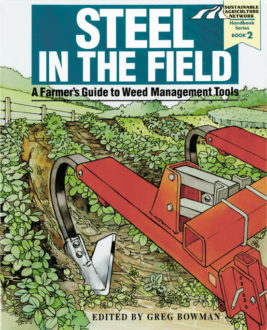Publisher's Foreword
Controlling weeds with reduced reliance on herbicides is one of the main challenges facing farmers interested in moving toward a more sustainable agriculture. Some are concerned about the potential health implications of handling herbicides. Others worry about groundwater contamination. Still more farmers and ranchers have seen the escalating costs of bringing new, less environmentally harmful chemicals to market and have witnessed the development of “super weeds” that are resistant to commonly used herbicides. Therefore, finding alternative weed control strategies remains of great practical importance.
In some ways, cultivating for weed control is almost a lost art. Herbicides seemed to work so well for so long that many farmers abandoned mechanical means of control. But now, with new implements and improved versions of the basic rotary hoes, basket weeders and flame weeders of 50 years ago, we are seeing improved efficiency and renewed interest in mechanical cultivation.
Farmers are employing many techniques to control weeds, including careful selection of crops in rotations, using cover crops to compete with and smother weeds and, of course, mechanical cultivation.
This book will provide you with information about how each implement works in the field in sustainable weed management systems. It also rates each tool’s usefulness in certain conditions, what problems other farmers have identified with that tool and where to obtain more information.
First published in 1997, this revised 2002 version of Steel in the Field includes updated tool sources with World Wide Web sites, updated contact information for our list of experts and current tool prices. Thanks to SAN’s Jennifer Butler for leading the revision effort.
You may want to travel to farms or research sites to see these implements in use. (See the list of experts.) We hope this book will help reduce the legwork in finding the right set of implements that works well on your farm.
After you read the book, let us know what you think! Did this bulletin prompt you to make any changes to your farming operation? This and other feedback is greatly appreciated!
Andy Clark, Coordinator
Sustainable Agriculture Network
April 2002
